Thank you to guest blogger, Andrea Edwards, who shares her experience of spending the ‘summer’ working on the Charles Lyell correspondence…
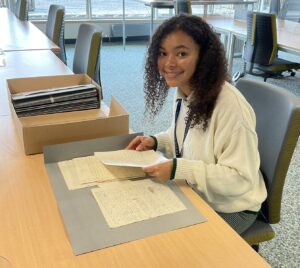
Andrea at work, studying Lyell’s American correspondence, in the Centre for Research Collections, University of Edinburgh.
Hi! My name is Andrea Edwards. I am an undergraduate student at the University of Wyoming (UW), majoring in History and Environmental Studies, and minoring in Museum Studies. I travelled to Scotland to do a month-long internship, funded my university’s ‘UW in Scotland’ program. On securing funding, I had to find myself a placement, and I contacted Heritage Collections staff at the University of Edinburgh, and agreed a placement based with the Centre for Research Collections (CRC) in order to learn about and gain experience in UK archives.
During my time there, I learned a lot about how archivists work in the UK, which combined with my knowledge and experience of collections management in the US, really extended my understanding. We talked about the current state of the heritage sector, discussing topics such as budgeting, colonial legacies, the climate crisis, and changes in best practice. It was fascinating to see how the staff at Heritage Collections are dealing with these global issues, compared to the US. I was able to meet and work with lots of amazing people, specifically my supervisor Pamela McIntyre, archivist extraordinaire. I also visited many other heritage organizations, such as the Royal Botanic Garden Edinburgh archives and the Royal College of Physicians of Edinburgh, to learn about they manage their collections.
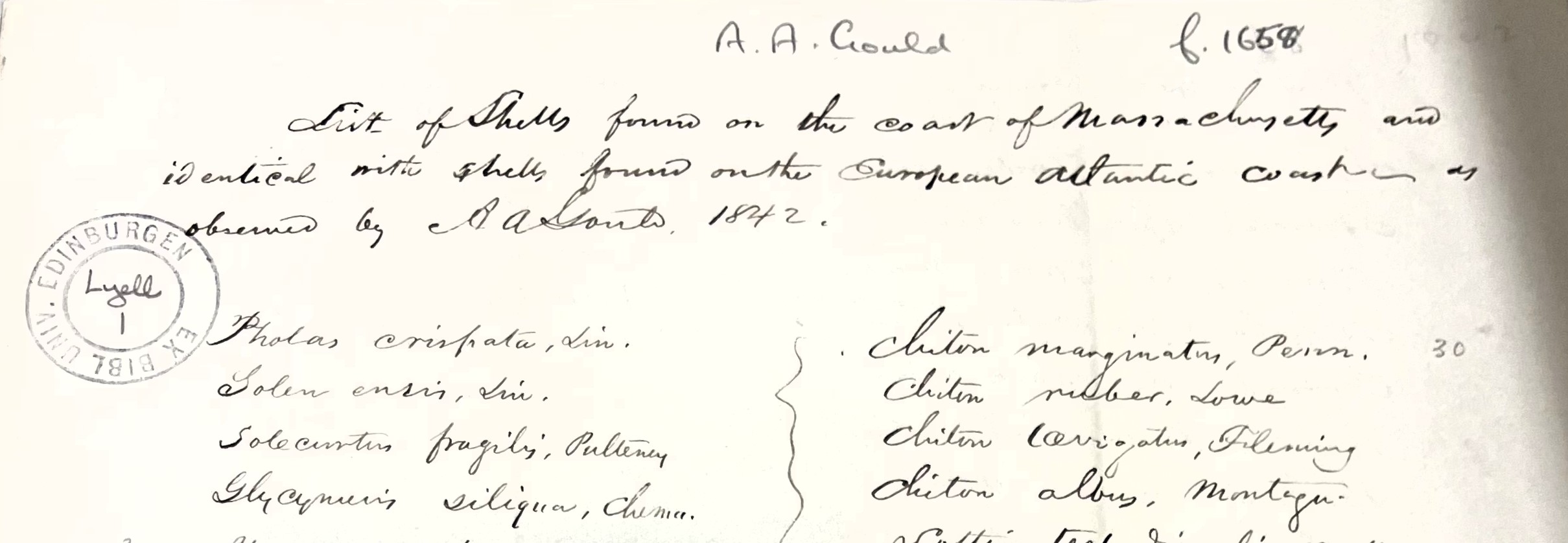
Start of a list of shells, found on the coast of Massachusetts, and identical with shells found on the European Atlantic Coasts, observed by AA Gould 1842, and sent to Lyell
My main project during my time in Scotland was cataloging Charles Lyell’s American correspondence. Charles Lyell travelled extensively throughout the UK, Europe, and Scandinavia, in order to conduct his research. Lyell also visited North America, 4 times, between 1841-1853. During those trips, Lyell made several connections with prominent American scientists and politicians, and continued to stay in touch with many over the years, generating quite a bit of correspondence.
The recent revision of the Lyell collection based at the University of Edinburgh, has identified much more correspondence from American born or based correspondents than perhaps previously has been understood. A lot of this has come from the increase in names ‘agents’ (the writers of the letters) being identified, and extended from 40 to 308; as well as extended by an additional tranche of records coming to the University in 2020. The purpose of my project was to add more detail to the catalogue for Lyell’s American correspondence. I was assigned 19 folders, and went through each, counting the number of letters and making notes of significant people, places, or subjects mentioned in each individual letter, allowing me to create a comprehensive scope and content on each file. I was able to catalogue 93 individual letters, with dates ranging from 1841-1875.
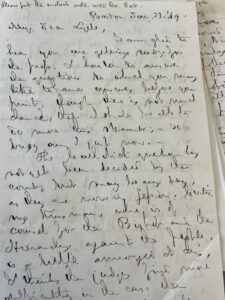
Letter from Ticknor, to Lyell, written at Boston, 23 January 1849.
Through spending time with these records, I got to understand the extent of Lyell’s personal and professional network abroad. Lyell corresponded with people that headed American society: politicians, doctors, university professors, and naturalists. Some characters that he corresponded with include naturalist and conchologist Augustus Addison Gould, and Charles Thomas Jackson, a New England physician and scientist, with a reputation of accusing others of claiming his discoveries. His correspondence with Lyell perhaps confirms Lyell’s position as an ‘authenticator of fact’. Twenty letters to Lyell from George Ticknor, an academic and Hispanist, document his feelings about the Mexican American War, his gossipy tone revealing the friendship between them. William C. Redfield, a meteorologist who gets very excited about fossil fish— content which now flags up another potential topic of investigation in the Cockburn Geological Museum! The correspondence creates a mosaic not only of Lyell’s personal relations, but of the United States’ fledgling academic community, a very tight knit community where everyone writes for the Benjamin Silliman’s journal, is related to a Boston Brahmin family, and knew and extensively talked about each other— the work of Louis Agassiz being regularly mentioned throughout.
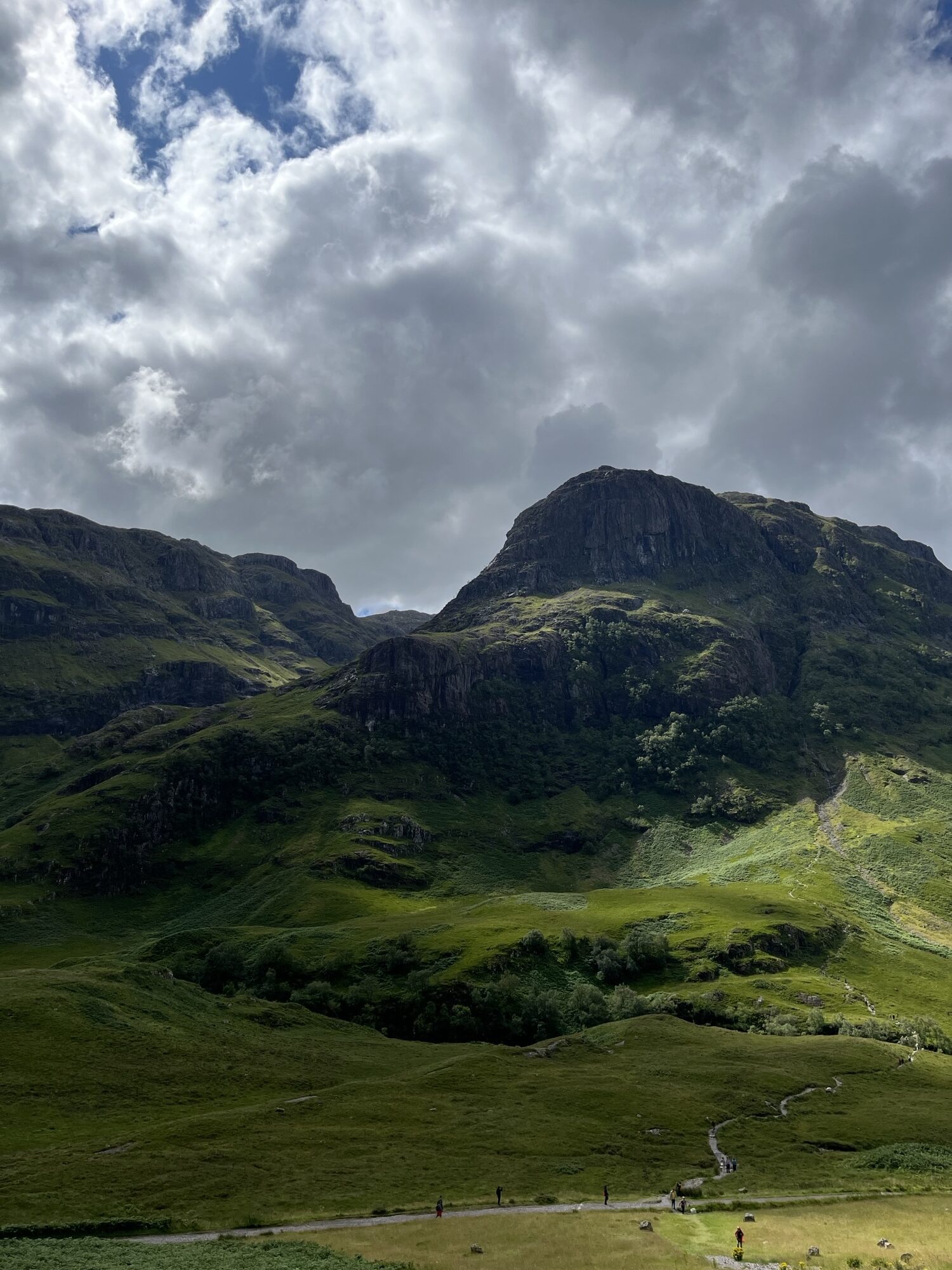
This years ‘summer’ backlit Glencoe’s amazing geology, especially for Andrea….
Lyell travelled throughout this life. I felt encouraged by him to explore Scotland, and it lived up to every expectation. I spent most of my time in Edinburgh, exploring all of its nooks and crannies, and absolutely fell in love with the city. It has such a charming and intimate atmosphere, and despite this being my first solo trip, it felt like a home away from home. I took the time to visit Glasgow, Inverness, and bits of the Highlands, all of which were amazing places that I would love to visit again. I loved the public transportation! Throughout my travels, I loved how climate conscious Scotland is, and I was impressed with their mindfulness about waste and their carbon footprint. It was especially interesting how Heritage Collections strive to apply this thinking to their work.
Everyone I met was so nice and welcoming. Everything was so beautiful, from the winding medieval streets of Edinburgh to the lush green peaks of Glencoe. I will always treasure my time spent there. But it’s also gratifying to know that I’ve also made an impression on Scotland. Due to the work that I have done, Lyell’s American correspondence has been enriched— taking their detail from a scant skeleton entry, to exact dates, extent, content and related agents. This had made this special subset of study more accessible to researchers. I wish them luck on their journey.
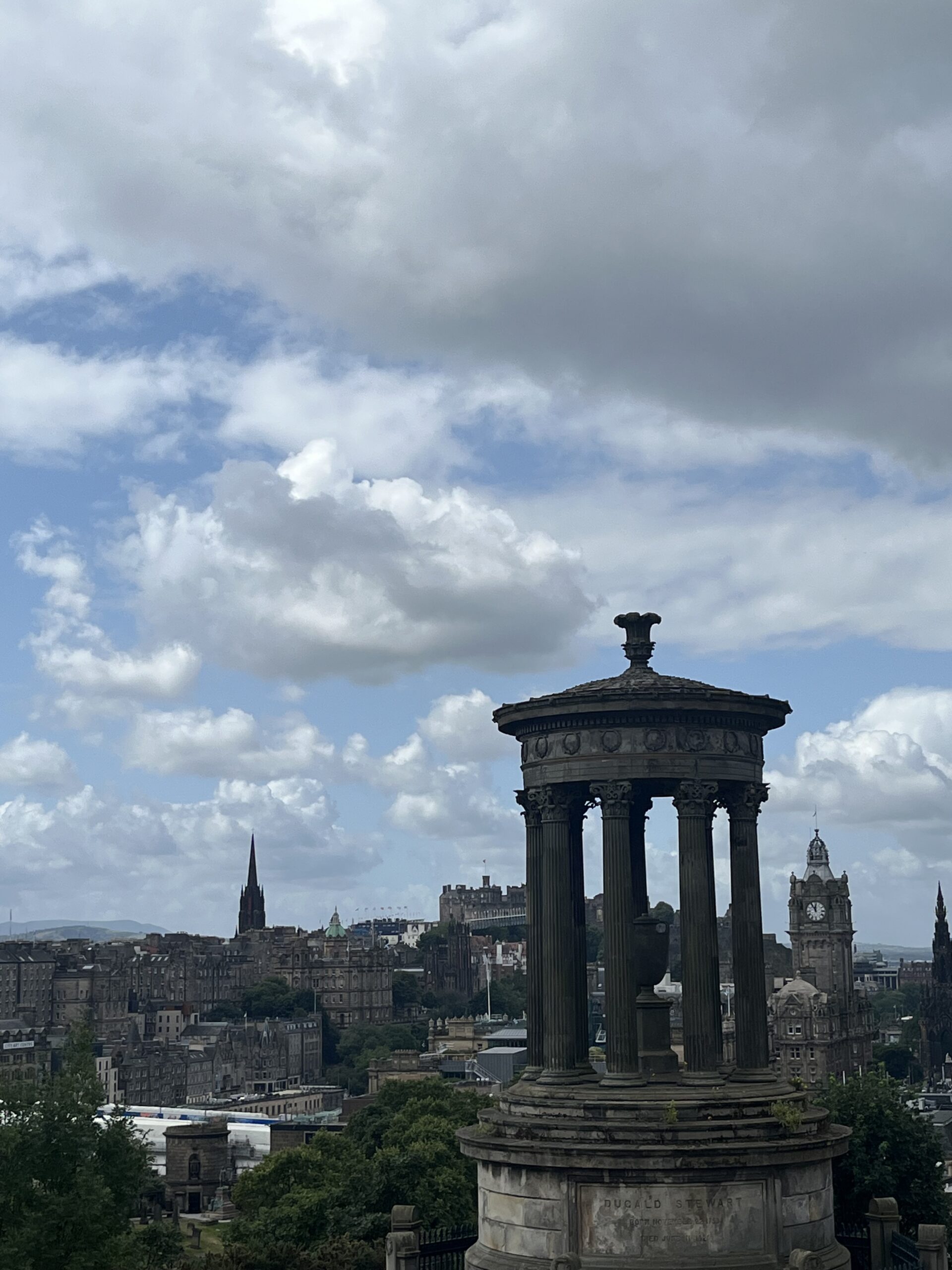
We also want to express our gratitude to the University of Wyoming for supporting Andrea’s cross-cultural internship, which has enhanced our understanding of Lyell’s global connections. A special thank you to our colleagues at Royal Botanic Gardens Edinburgh, the Royal College of Physicians of Edinburgh and all the staff at Heritage Collections for their warm welcome and mentorship, which made Andrea’s experience both educational and memorable. But, most of all, thank you for all your efforts Andrea.

Brilliant blog and valuable work to be shared and enjoyed. I volunteer with crc also and it’s such a treasure of resources staffed by such lovely, supportive and expert folks. Lyell handwriting defeated me so further reward for the endeavours. Thanks. Ash.
Update! All of Andrea’s work is now available in the Charles Lyell catalogue – https://archives.collections.ed.ac.uk/search?q%5B%5D=Andrea++Edwards&op%5B%5D=&field%5B%5D=keyword&from_year%5B%5D=&to_year%5B%5D=&page=2